Manufacturing specialists play a key role in optimizing production processes and ensuring quality output. However, many companies struggle to find the right fit for this position. The challenge often lies in identifying candidates who possess both technical expertise and practical problem-solving skills. It's not just about finding someone who looks good on paper; it's about discovering a professional who can adapt to your specific manufacturing environment and drive continuous improvement.
This article provides a comprehensive guide on how to hire a manufacturing specialist, covering everything from the hiring process to key qualifications and effective screening methods. We'll also explore essential skills required for manufacturing specialists to help you make informed decisions during the recruitment process.
Table of contents
Manufacturing Specialist Hiring Process
The hiring process for a Manufacturing Specialist typically spans 1 to 2 months. This timeline ensures a thorough assessment of candidates to find the right fit for your organization.
- Step 1: Start by crafting a clear and detailed job description that outlines the necessary skills and responsibilities. Post this on relevant job platforms to attract suitable candidates.
- Step 2: Expect to start receiving resumes within the first week. Take time to review them and shortlist candidates who meet the basic qualifications.
- Step 3: Conduct skill assessments tailored to the role, which may include practical tests or case studies. Allocate about a week for this stage to gather results.
- Step 4: Invite shortlisted candidates for interviews, focusing on both technical and behavioral aspects of their experience. The top candidates will move forward to the offer stage.
In summary, the hiring process for a Manufacturing Specialist involves several key steps that can take up to two months. As you navigate through this journey, expect to refine your approach and adapt based on candidate responses. Let's explore these steps in more detail, complete with checklists and resources.
Key Skills and Qualifications for a Manufacturing Specialist
Hiring the right Manufacturing Specialist can be challenging, especially when defining the ideal candidate profile. What one company considers essential might just be a bonus elsewhere. It's important to clearly differentiate between required skills and preferred qualifications to attract the best talent.
Typically, a strong candidate will possess a bachelor's degree in Manufacturing Engineering or a related field, along with several years of experience in production environments. Additionally, familiarity with manufacturing processes like Lean Manufacturing and Six Sigma is critical.
Preferred qualifications can include a master's degree, experience with Industry 4.0 technologies, and leadership experience, which can enhance a candidate's profile. Understanding these distinctions will help you focus your search on candidates who meet your company's specific needs.
| Required skills and qualifications | Preferred skills and qualifications |
|---|---|
| Bachelor's degree in Manufacturing Engineering, Mechanical Engineering, or a related field | Master's degree in a relevant field |
| Minimum of 3 years of experience in manufacturing or production environments | Experience with Industry 4.0 technologies such as IoT and Automation |
| Strong knowledge of manufacturing processes, including Lean Manufacturing and Six Sigma | Familiarity with ERP/MRP systems |
| Excellent problem-solving skills and attention to detail | Demonstrated leadership experience managing teams |
| Proficient in using CAD software and other manufacturing tools | Experience with quality control and assurance processes |
How to Write a Manufacturing Specialist Job Description
Crafting a compelling Manufacturing Specialist job description is key to attracting the right talent. Once you have a candidate profile ready, the next step is capturing that information to draw in qualified candidates.
- Highlight Key Responsibilities and Impact: Clearly outline the core duties of the Manufacturing Specialist, such as overseeing production processes, ensuring quality standards, and coordinating with the engineering team. Emphasize how their role supports operational objectives and contributes to the company's growth.
- Balance Technical Skills with Industry Expertise: Specify required technical proficiencies and certifications, such as experience with CAD software or lean manufacturing. Include soft skills like team collaboration and problem-solving, which are essential for a well-rounded candidate.
- Showcase Unique Selling Points: Highlight what makes your company and the role attractive. Whether it's innovative technologies, career advancement opportunities, or a strong team culture, these elements can set your job apart and attract top-tier professionals.
For detailed insights into crafting a comprehensive job description, explore the Manufacturing Specialist job description.
Top Platforms to Hire Manufacturing Specialists
Now that you have a well-defined job description for your manufacturing specialist position, it's time to target the right platforms for sourcing candidates. Job listing sites offer access to a vast pool of potential candidates, making it easier to find the right fit for your organization.
LinkedIn Jobs
Ideal for finding full-time manufacturing specialists. Large user base and professional networking features make it excellent for discovering qualified candidates.

Indeed
Great for posting full-time manufacturing specialist positions. Wide reach and easy-to-use interface for both recruiters and job seekers.

Monster
Useful for full-time manufacturing roles. Offers targeted job postings and resume search capabilities.
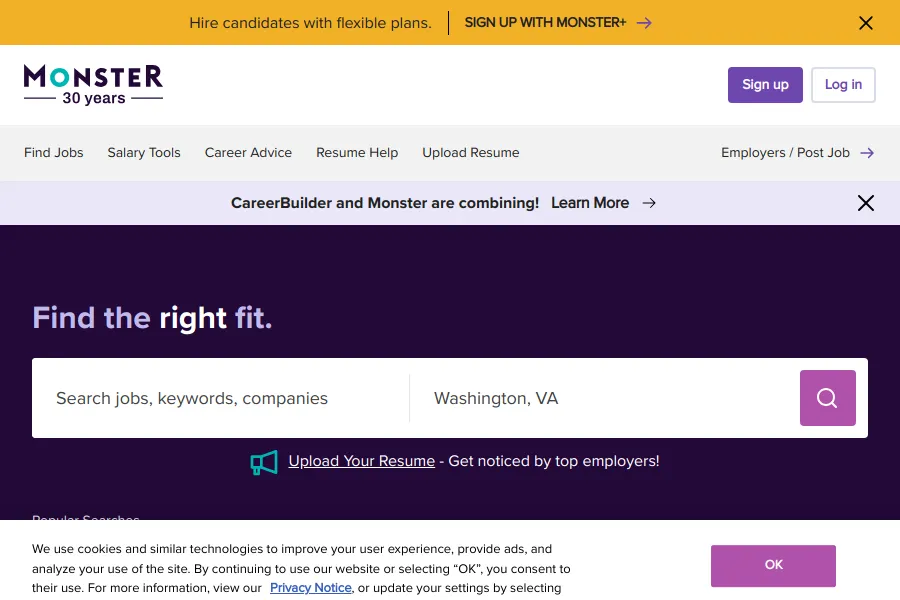
Among the top choices, LinkedIn Jobs is excellent for full-time roles, leveraging its professional networking features. Indeed and Monster also stand out for their wide reach and user-friendly interfaces, ideal for posting full-time manufacturing specialist positions. Alongside these, platforms like Glassdoor and CareerBuilder provide valuable insights into company culture and advanced matching technology, respectively, ensuring you connect with informed and relevant candidates.
Keywords to Look for in Manufacturing Specialist Resumes
Resume screening is a key step in finding the right Manufacturing Specialist. It helps you quickly identify candidates with the most relevant skills and experience before moving to interviews.
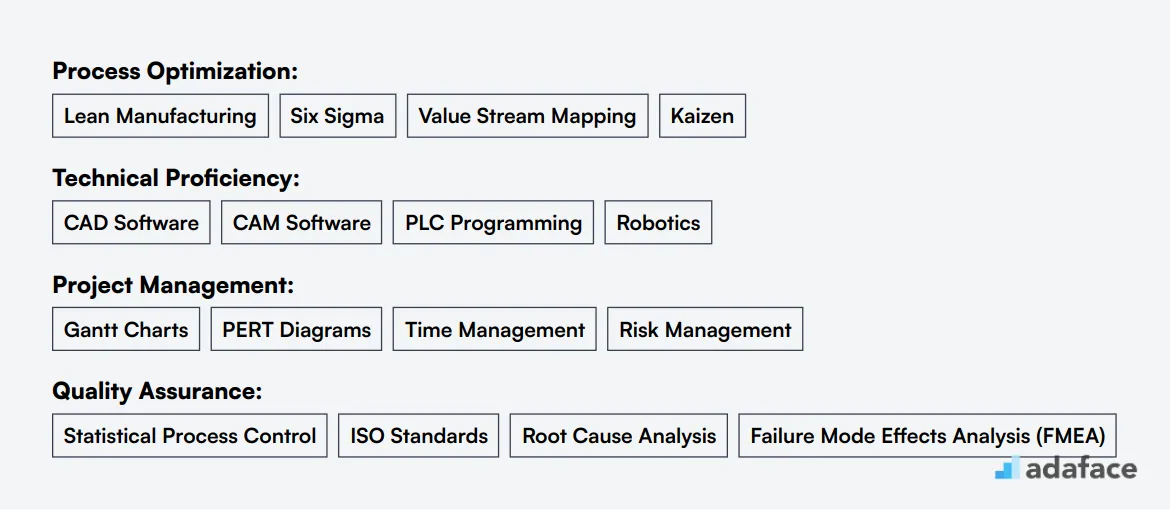
When manually screening resumes, focus on keywords that match the job requirements. Look for terms like 'Lean Manufacturing', 'Six Sigma', 'CAD software', and 'process optimization'. This approach helps you shortlist candidates who align with your needs.
AI tools can streamline the resume screening process. You can use AI language models to analyze resumes based on specific keywords and criteria, saving time and improving accuracy in candidate selection.
Here's a sample prompt for AI-assisted resume screening:
TASK: Screen resumes for Manufacturing Specialist role
INPUT: Resumes
OUTPUT: For each resume, provide:
- Email id
- Name
- Matching keywords
- Score (out of 10)
- Recommendation
- Shortlist (Yes, No, Maybe)
RULES:
- If unsure, mark as Maybe
- Keep recommendations concise
KEYWORDS:
- Manufacturing processes (Lean, Six Sigma)
- CAD software
- Problem-solving
- Process optimization
- Quality control
- [Technical expertise](https://www.adaface.com/assessment-test/technical-aptitude-test)
Recommended Skills Tests to Screen Manufacturing Specialists
Conducting skills tests is an effective way to ensure you hire the best manufacturing specialists by assessing their technical and problem-solving abilities. These tests provide a clearer picture of a candidate's capability beyond their resume, helping you make informed hiring decisions.
Attention to Detail Test: Manufacturing specialists often work on detailed tasks that require precision. The Attention to Detail Test helps evaluate a candidate's ability to notice minute discrepancies and ensure quality control.
Problem Solving Test: A key trait for anyone in manufacturing is the ability to solve problems efficiently. The Problem Solving Test gauges how candidates approach and resolve issues, a daily requirement in manufacturing settings.
Technical Aptitude Test: To assess whether candidates have the required technical skills, the Technical Aptitude Test examines their understanding of manufacturing processes and tools, ensuring they can handle the technical demands of the role.
Project Management Test: Manufacturing specialists often juggle multiple tasks and projects. The Project Management Test evaluates their ability to plan, execute, and oversee projects successfully.
Critical Thinking Test: To make the right decisions quickly, manufacturing specialists need strong critical thinking skills. The Critical Thinking Test measures their capacity to analyze situations and make logical conclusions.
How much does it cost to hire a Manufacturing Specialist?
Hiring a Manufacturing Specialist can vary widely in cost depending on the location and experience level. In the United States, the average salary is about $83,609, with figures ranging from $37,076 to $142,911. In India, salaries typically range from INR 308,242 to INR 1,355,358 annually, while in Australia, the salary span is from $34,580 AUD to $202,764 AUD. Canada sees average salaries around CAD 76,916, with a range between CAD 43,523 and CAD 117,102.
Manufacturing Specialist Salary United States
The average salary for a Manufacturing Specialist in the United States is approximately $83,609 annually. Salaries can range broadly, starting from around $37,076 and reaching up to $142,911. These figures vary depending on the location and experience level, with cities like San Jose and San Diego offering higher averages compared to other regions.
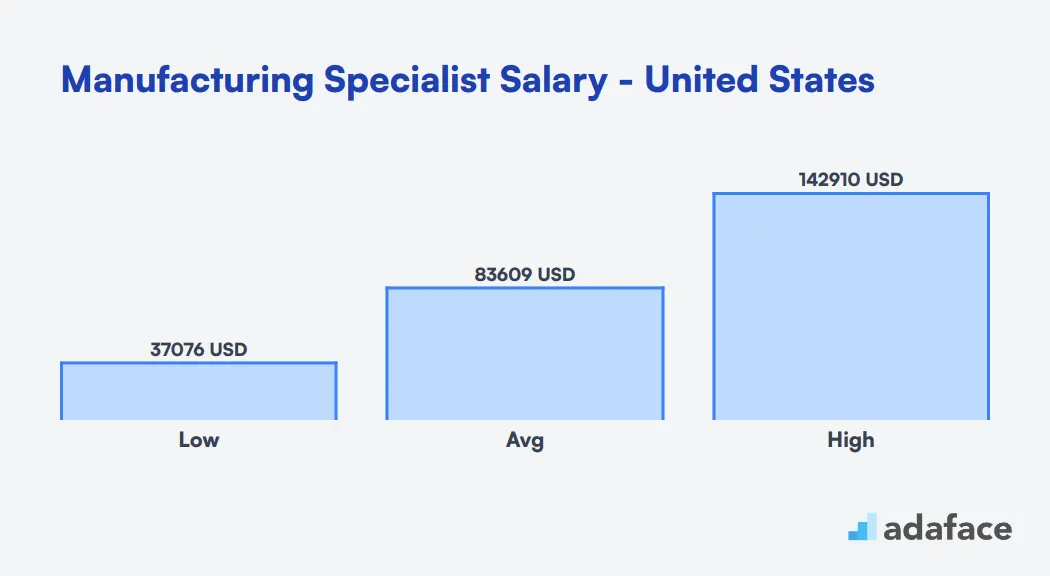
Manufacturing Specialist Salary in Australia
The salary range for Manufacturing Specialists in Australia varies significantly based on location and experience. For example, in Sydney, the average salary is around $134,126 AUD, while in Brisbane, it drops to approximately $106,293 AUD. Overall, salaries can span from about $34,580 AUD to $202,764 AUD depending on various factors.
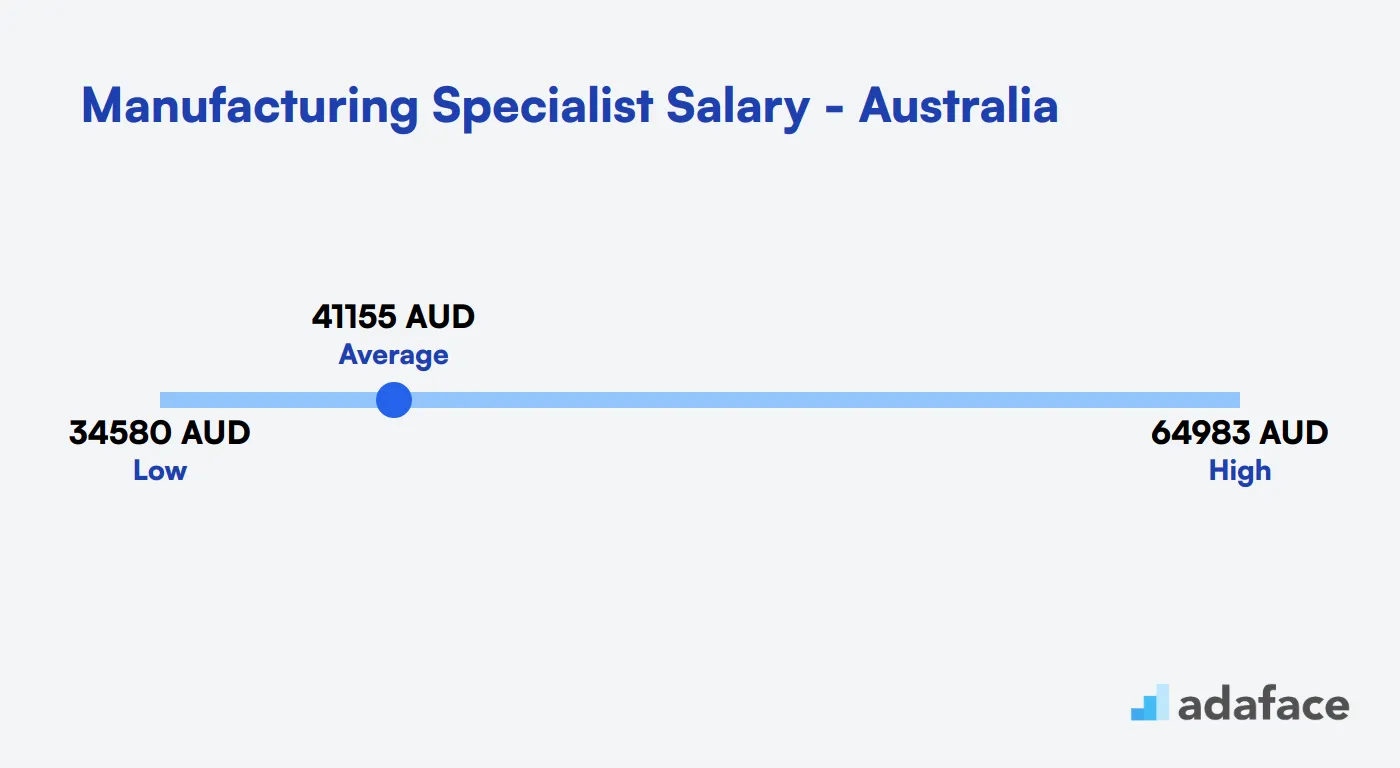
Manufacturing Specialist Salary in Canada
In Canada, the average salary for a Manufacturing Specialist is approximately CAD 76,916 per year. Salaries can range from a minimum of CAD 43,523 to a maximum of CAD 117,102, depending on the location and industry demands. For example, cities like Montréal and Kelowna offer higher salaries, with averages reaching CAD 146,985 and CAD 87,757, respectively.
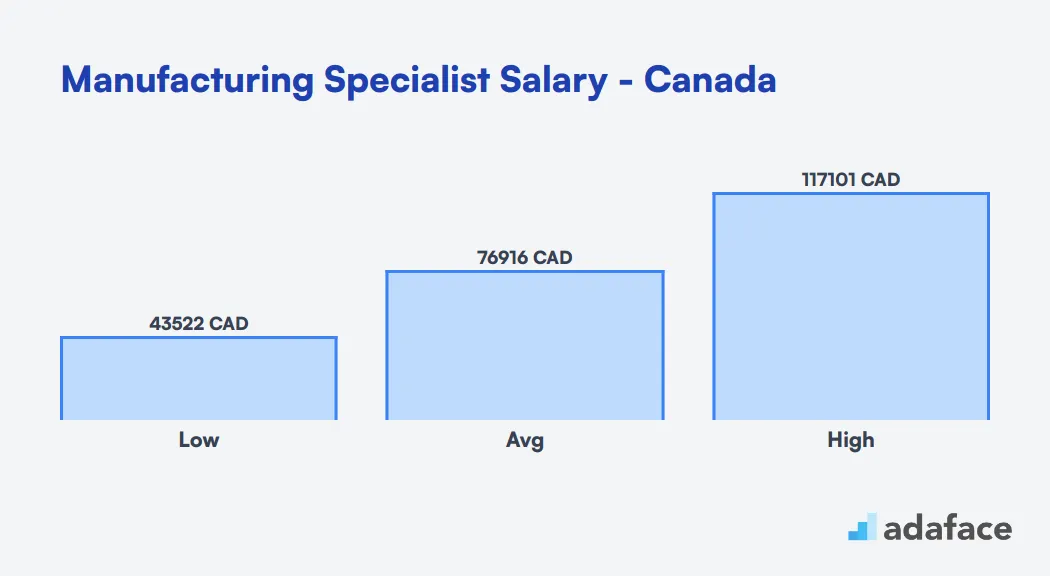
Manufacturing Specialist Salary in India
The average salary for a Manufacturing Specialist in India typically ranges from INR 308,242 to INR 1,355,358 per year. On average, professionals in this role earn around INR 763,776, with variations depending on the city and industry. For example, salaries in Mumbai can reach up to INR 1,307,388, while positions in Kolkata may start as low as INR 145,497.
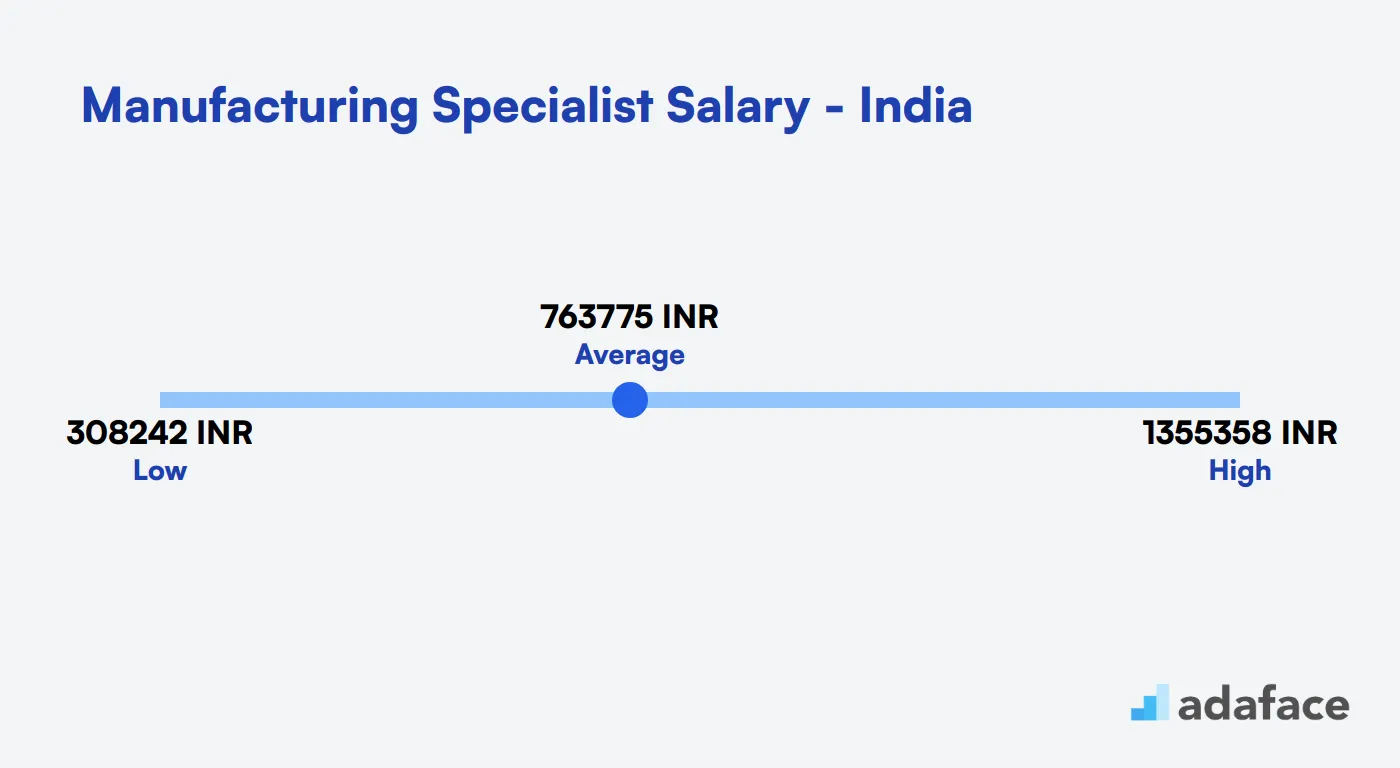
What are the ranks of Manufacturing Specialists?
Understanding the ranks in manufacturing can be a challenge, especially since the roles often overlap in responsibilities. However, recognizing these distinctions is key for hiring managers to effectively recruit and develop a team of skilled professionals.
• Entry-Level Manufacturing Specialist: This position typically involves hands-on tasks such as operating machinery, maintaining production lines, and handling raw materials. Individuals at this level are just beginning their careers and often work under the guidance of more experienced specialists.
• Mid-Level Manufacturing Specialist: With some experience under their belt, mid-level specialists take on more responsibility, including overseeing production processes, coordinating with other departments, and contributing to efficiency improvements. They act as a bridge between entry-level workers and senior management.
• Senior Manufacturing Specialist: At this rank, specialists lead projects, manage teams, and are involved in strategic planning. They have a comprehensive understanding of the manufacturing process and focus on innovation and quality assurance to enhance productivity.
• Lead Manufacturing Specialist: This top-tier role involves setting goals, developing policies, and ensuring the alignment of manufacturing objectives with business goals. Lead specialists are often involved in decision-making processes and work closely with executives, providing expert insights into manufacturing strategies.
Hire the Right Manufacturing Specialists for Your Team
In this blog post, we've walked you through the essential steps of hiring a Manufacturing Specialist—from understanding the fundamental skills required, to crafting the perfect job description, and knowing where to find top talent. With these insights, you are well-equipped to navigate the hiring process confidently.
Remember, the key to hiring success lies in using accurate job descriptions and leveraging skill assessments to ensure precision in your selection. Consider using role-specific tests to evaluate candidates' capabilities effectively. This approach not only optimizes the recruitment process but also significantly enhances the quality of your hires.
Attention To Detail Test
FAQs
Look for candidates with a degree in manufacturing engineering, industrial engineering, or a related field. Relevant certifications, such as Six Sigma or Lean Manufacturing, are also valuable. Experience with manufacturing processes, quality control systems, and production planning is essential.
Use a combination of technical aptitude tests, practical assessments, and scenario-based interview questions. Consider having candidates solve real manufacturing problems or present case studies related to process improvement.
Look for candidates on industry-specific job boards, professional networking sites, and manufacturing associations. Employee referrals and partnerships with technical schools or universities can also be effective sources for talent.
Key soft skills include problem-solving, communication, teamwork, adaptability, and leadership. These skills are crucial for collaborating with various departments and implementing process improvements.
Conduct behavioral interviews to assess cultural fit. Include team members in the interview process and consider a trial period or project to evaluate how well the candidate integrates with your team and adapts to your company's work environment.
Ask about their experience with specific manufacturing processes, problem-solving approaches, and examples of process improvements they've implemented. Use situational interview questions to gauge how they would handle real-world scenarios in your manufacturing environment.
The hiring process can take 4-8 weeks on average, depending on your company's needs and the availability of qualified candidates. This timeline includes initial screening, interviews, skills assessments, and final decision-making.

40 min skill tests.
No trick questions.
Accurate shortlisting.
We make it easy for you to find the best candidates in your pipeline with a 40 min skills test.
Try for freeRelated posts
Free resources



